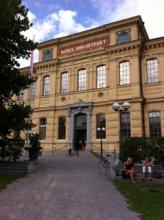I am the fortunate recipient of the 2016-17 Ruth Kielland-Leif and Sophie Løvdal Fellowship. This fact makes my dissertation research in Oslo, Norway, and Gothenburg, Sweden possible; research that my Swedish advisor at the University of Gothenburg, Professor Yvonne Leffler, has assured me has the potential to constitute a unique contribution to the understanding of Scandinavian literary history.
Briefly, my working dissertation title is “Intolerable Affect: Intensity in Emilie Flygare-Carlén’s Novels and Contemporary Reception.” Despite the fact that Flygare-Carlén’s novels, along with Fredrika Bremer’s, were Sweden’s most exported products during the mid 19th-century, her work has until recently fallen out of the textbooks and general literary history, as well. Her contemporary importance as an innovator in Swedish and other national fictions was well-noted during her lifetime but with the rise of the new moralism of the 1850s Flygare Carlén, along with many other, primarily women writers, was ridiculed and attacked for producing “lousy literature.” Yet, as my research shows, August Strindberg and Bjørnstjerne Bjørnson admittedly read and were inspired by her writing, as was many of our famous women authors. While digitization increasingly affords scholars the ability to do research from their home institutions, the references to Flygare-Carlén’s influence on Strindberg and Bjørnson would not have been possible without actually having direct physical access to the National Libraries of Sweden and Norway. The support of the Kielland-Løvdal and an earlier grant from the Swedish Institute is the reason that I can pursue my interest in sleuthing through old books, letters, articles, and reviews and recover forgotten facts about our literary history.
Since I am pursuing Flygare-Carlén’s trans-Scandinavian reception, it is vital that I spend extensive amounts of time in the national and sometimes even local or institutional libraries, as many of the old periodicals and obscure books can only be read in either hardcopy or on microfilm, neither of which leave their home libraries. In the 19th-century reviews that I have already uncovered, Flygare-Carlén was both heralded as one of Sweden’s greatest writers, man or woman, while others ridiculed her choice of topics, West Coast smugglers and fishermen, crime, and commerce because she was a woman. Circumscribing her knowledge based on gender stereotypes was as flawed then as it is now. Flygare-Carlén was the daughter of a coastal merchant and the apple of her father’s eye. She spent much time traversing the coastal waters of Bohuslän, both as a girl traveling with her father and later as a young businesswoman plying her family’s trade. Flygare-Carlén’s life is itself novel-worthy.
However, as compelling as Flygare-Carlén’s life and authorship are, her varied reception is as compelling to study because of how it contributes an uncommon understanding of the actual development of the Scandinavian novel. Flygare-Carlén was one of the most experimental and innovative writers of her time, and her contemporary reviewers frequently acknowledge as much. It is now only discussed amongst a few scholars in literary history, that what was later termed realism or naturalism, or even literary trends associated with the modern breakthrough, are already present in her early-mid-19th-century work.
Without the Kielland-Løvdal Fellowship, I would not have the opportunity to geographically relocate and to spend the required time sorting through old, not yet digitized, materials. Also, since Copenhagen was one of the mid-19th-century’s Scandinavian literary hotbeds, my topic also necessitates that I spend time in the Royal Library of Denmark, in Copenhagen. This excursion is made possible by the generous contributions of the Leslie Ann Grove Fund for Graduate Travel and the Peterson Family Scholarship.
I want to end by mentioning that the aforementioned financial support not only funds my scholarship but also allows me to pursue it in amazing settings, both historical and modern, where I am immersed in the various national languages and cultures. Also, my home institution, the University of Washington, and the Department of Scandinavian Studies are fundamental to my work, as are the host institutions here in Scandinavia, ILOS, the Institute for Literature, Area Studies, and European Languages at the University of Oslo, Norway and LIR, the Institute for Literature, the History of Ideas and Religion, at the University of Gothenburg, Sweden. What I am so fortunate to experience is something that I wholeheartedly wish for every developing scholar. Because research so often requires travel and extensive periods of time, it is with the support from institutional and private grants that we are able to produce our best and most meaningful work. Thank you!
